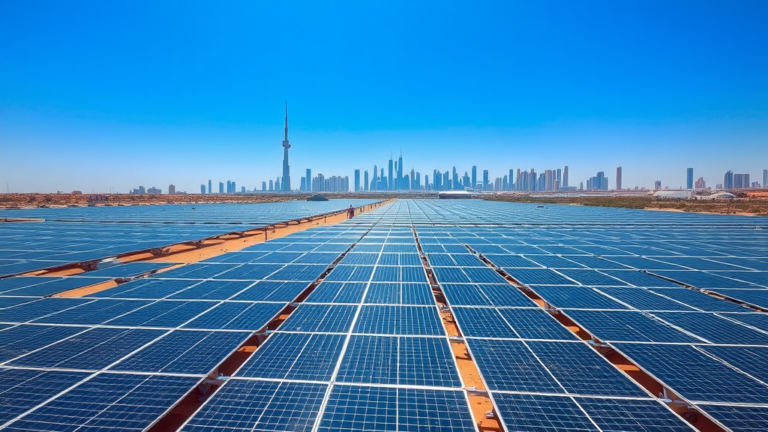Renewable energy plays a pivotal role in shaping Dubai’s economic future, driving sustainability and creating new opportunities for growth. With an increasing global focus on climate change and environmental impact, Dubai is positioning itself as a leader in renewable energy investments, enhancing its economic diversification strategy. The emirate aims to generate 75% of its energy from clean sources by 2050, which directly contributes to both its economic development and the global sustainability agenda. This article explores the dynamics of how renewable energy influences Dubai’s economy, looking into the investments, jobs created, and the infrastructural developments that stem from this green revolution.
Investments in Renewable Energy Projects

Dubai has made significant investments in renewable energy projects, making it one of the fastest-growing markets for green energy in the region. The emirate, through the Dubai Electricity and Water Authority (DEWA), has initiated numerous projects aimed at harnessing solar energy, wind power, and other renewable sources. Notable initiatives include:
- The Mohammed bin Rashid Al Maktoum Solar Park: This is the largest solar park in the world, aiming for a total capacity of 5,000 MW by 2030.
- The Dubai Clean Energy Strategy 2050: Aimed at diversifying energy sources, the strategy outlines investments and projects that support clean energy.
- Engagement with International Renewable Energy Agencies: Collaborating with global entities for knowledge exchange and funding opportunities.
These investments not only bolster Dubai’s energy security but also make the emirate a hub for innovation in clean technologies. With sustainable initiatives being financially viable, private investors and international companies are increasingly eager to partner in these projects. This influx of capital aids in economic diversification and positions Dubai as a regional leader in renewable energy.
Job Creation in the Renewable Sector

The transition to renewable energy in Dubai is not just an investment in infrastructure; it is also a significant engine for job creation. The renewable sector offers various employment opportunities which contribute to economic stability and development. The types of jobs created include:
- Engineering and Technical Roles: These include roles in solar panel installation, maintenance of wind turbines, and energy efficiency assessments.
- Project Management Positions: Leading large projects that require careful coordination and management from conception through completion.
- Research and Development Opportunities: Innovation in energy technology and efficiency are key for long-term success.
Moreover, the growth of the renewable energy sector has a multiplier effect on other industries, stimulating indirect job opportunities in construction, IT support, logistics, and manufacturing. As more skilled workers are trained and retained in these new industries, there will be a long-term positive impact on the emirate’s economic landscape.
Renewable energy projects are also catalyzing infrastructure development across Dubai. Improved infrastructure not only supports energy projects but enhances the overall economic fabric of the region. Key developments include:
- Smart Grids: Investment in smart grid technology optimizes energy distribution and enhances energy efficiency.
- Sustainable Transportation: Initiatives are underway to improve electric vehicle infrastructure, making clean transportation more accessible.
- Research Facilities: Establishing centers for renewable research encourages innovation and attracts international talent.
These infrastructure improvements enhance the quality of life and boost economic productivity, creating a virtuous cycle where increased efficiency fosters economic growth.
Dubai’s Role in Regional Renewable Energy Initiatives
As a regional leader in renewable energy, Dubai is influencing neighboring countries through collaboration and knowledge-sharing initiatives. The emirate participates in various regional organizations and partnerships aimed at promoting green energy. Influencing factors include:
- Knowledge Exchange Programs: Dubai shares its experiences in developing renewable energy with other Gulf Cooperation Council (GCC) nations.
- Regional Investment: Opening investment opportunities in solar energy and shared infrastructure projects.
- Commitment to Climate Goals: Dubai sets an example by adhering to international climate agreements and encouraging its neighbors to follow suit.
Such initiatives not only strengthen Dubai’s diplomatic relationships but also contribute to the overall regional economic resilience through sustainable practices.
Conclusion
Renewable energy is undeniably a cornerstone of Dubai’s economic growth trajectory. By investing in renewable projects, creating jobs, advancing infrastructure, and engaging in regional initiatives, Dubai is securing a sustainable future that drives its economy forward. The commitment to renewable energy not only prepares the emirate for a post-oil era but also consolidates its position as a regional leader in sustainability and economic diversification.
Frequently Asked Questions
1. What are the main sources of renewable energy in Dubai?
The main sources of renewable energy in Dubai include solar energy, wind power, and biomass. The emirate primarily focuses on solar energy, especially through the Mohammed bin Rashid Al Maktoum Solar Park.
2. How does renewable energy contribute to job creation in Dubai?
Renewable energy creates a variety of jobs in construction, engineering, project management, and technological development, boosting job opportunities across multiple sectors.
3. What is the Dubai Clean Energy Strategy 2050?
The Dubai Clean Energy Strategy 2050 aims to diversify energy sources and generate 75% of Dubai’s total energy consumption from clean sources by 2050, enhancing sustainability and energy security.
4. How does renewable energy impact Dubai’s infrastructure?
It leads to the development of smart grids, sustainable transportation options, and research facilities, enhancing overall economic productivity and quality of life in the region.
5. Why is Dubai considered a leader in renewable energy in the Middle East?
Dubai’s commitment to renewable energy projects, significant investments, and advancements in energy infrastructure make it a model for other countries in the region seeking to adopt sustainable practices.
